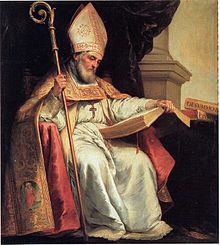
Back Isidor von Sevilla ALS إيزيدور الإشبيلي Arabic ايزيدورو السيفييانى ARZ Isidoru de Sevilla AST Sevilyalı İsidor Azerbaijani Ісідор Севільскі Byelorussian Ісыдор Сэвільскі BE-X-OLD Исидор Севилски Bulgarian Isidoro Sevilla Breton Isidor de Sevilla Catalan
Isidore of Seville | |
|---|---|
 St. Isidore of Seville (1655), depicted by Bartolomé Esteban Murillo | |
| Bishop, Confessor and Doctor of the Church | |
| Born | c. 560 Cartagena |
| Died | 4 April 636 (aged 75–76) Seville |
| Venerated in | |
| Canonized | Pre-Congregation |
| Feast | 4 April |
| Attributes |
|
| Patronage | Students Philosophy career |
| Notable work | Etymologiae |
| Era | Medieval philosophy |
| School | |
Main interests | Grammar, rhetoric, mathematics, medicine, law, languages, cities, animals and birds, the physical world, geography |
Notable ideas | Isidoran map |
Isidore of Seville (Latin: Isidorus Hispalensis; c. 560 – 4 April 636) was a Hispano-Roman scholar, theologian, and archbishop of Seville. He is widely regarded, in the words of 19th-century historian Montalembert, as "the last scholar of the ancient world".[2]
At a time of disintegration of classical culture,[3] aristocratic violence, and widespread illiteracy, Isidore was involved in the conversion of the Arian Visigothic kings to Chalcedonian Christianity, both assisting his brother Leander of Seville and continuing after his brother's death. He was influential in the inner circle of Sisebut, Visigothic king of Hispania. Like Leander, he played a prominent role in the Councils of Toledo and Seville.
His fame after his death was based on his Etymologiae, an etymological encyclopedia that assembled extracts of many books from classical antiquity that would have otherwise been lost. This work also helped standardize the use of the period (full stop), comma, and colon.[4]
Since the early Middle Ages, Isidore has sometimes been called Isidore the Younger or Isidore Junior (Latin: Isidorus iunior), because of the earlier history purportedly written by Isidore of Córdoba.[5]
- ^ Russell, R. P. "Augustinianism". New Catholic Encyclopedia. Retrieved 4 April 2021 – via Encyclopedia.com.
- ^ Montalembert, Charles F. Les Moines d'Occident depuis Saint Benoît jusqu'à Saint Bernard [The Monks of the West from Saint Benedict to Saint Bernard]. Paris: J. Lecoffre, 1860.
- ^ Jacques Fontaine, Isidore de Séville et la culture classique dans l'Espagne wisigothique (Paris) 1959
- ^ Houston, Keith. "The mysterious origins of punctuation". www.bbc.com. Retrieved 13 September 2022.
- ^ Bonnie J. Blackburn and Leofranc Holford-Strevens, eds., in Florentius de Faxolis, Book on Music (Harvard University Press, 2010), p. 262.
© MMXXIII Rich X Search. We shall prevail. All rights reserved. Rich X Search